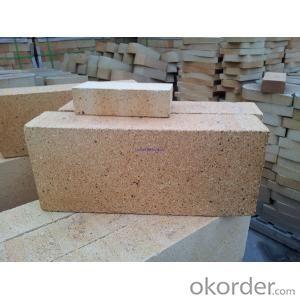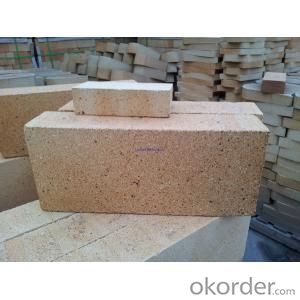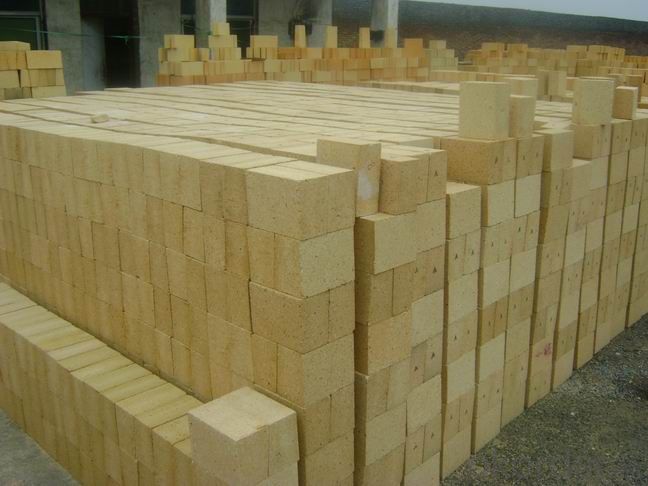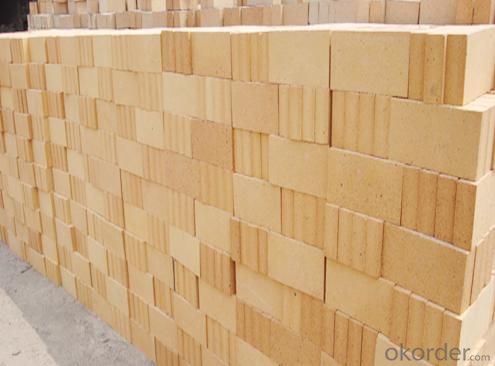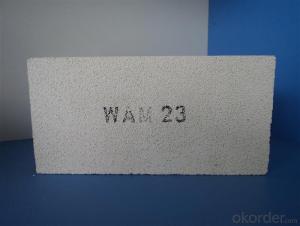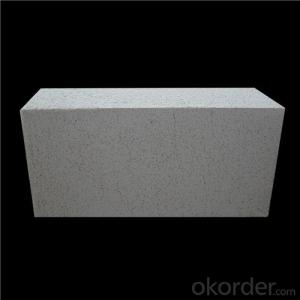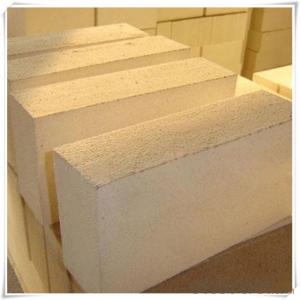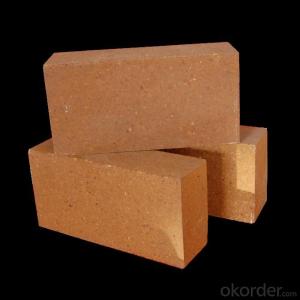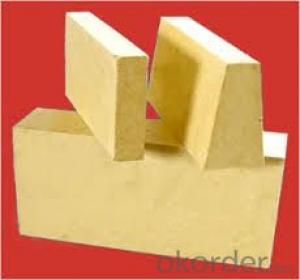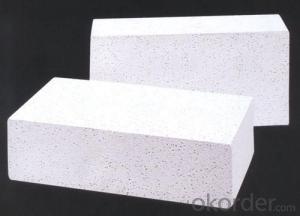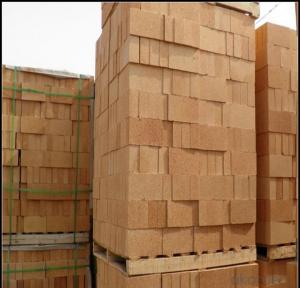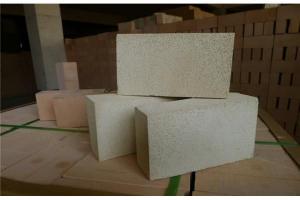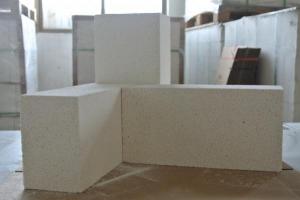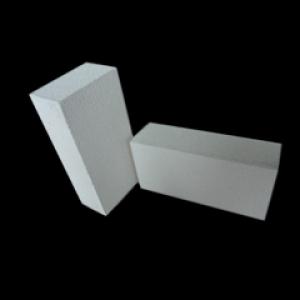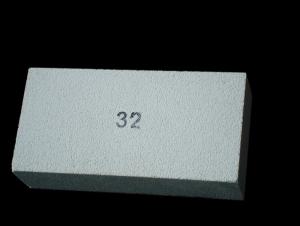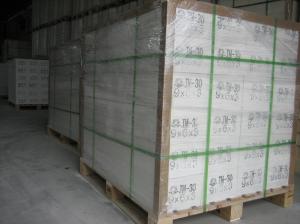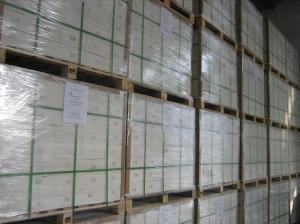Insulating Fire Brick for Thermal Insulation in Steel Industry
- Loading Port:
- Tianjin
- Payment Terms:
- TT OR LC
- Min Order Qty:
- 20 m.t.
- Supply Capability:
- 10000 m.t./month
OKorder Service Pledge
OKorder Financial Service
You Might Also Like
CNBM conforms strictly to the requirements of ISO 9000 quality control system during the production. MSDS is also available if you want. The thermal insulation fire clay brick meet with the requirements of ASTM & JIS standards. So pls stay cool with our quality.
Insulating Fire Brick Technical index
Product No. | IFB70 | IFB60 | IFB50 | IFB40 |
Al2O3 | 68%-72% | 58%-62% | 48%-52% | 38%-40% |
Refractoriness (°C ) | ≥1790 | ≥1790 | ≥1790 | ≥1790 |
Bulk density (g/cm3) | 2.50-2.60 | 2.35-2.45 | 2.20-2.30 | 2.10-2.20 |
Apparent porosity (%) | 22 | 19-22 | 17-20 | 17-20 |
Cold Crushing strength (kg) | 480-510 | 450-480 | 430-450 | 390-430 |
Application
Insulating Fire Brick are used for the lining of converter, alternating current arc furnace, direct Current arc furnace and the ladle slag line, etc.
Equipment
1 unit of Ceramic Abrasive (SG Abrasive) pilot production line
2 units of Compact grain Abrasive pilot production lines
1 unit of high-end coated abrasives (abrasive cloth) production line
2 units of Boron Carbide production lines
3 large flexible crushing and sieving lines for grit production lines
2 units of 2000KVA furnaces for Boron Carbide fusion
6 units of 5000KVA-10000KVA dumping type electric arc furnaces for Brown Fused Alumina fusion
Company Advantage
(1)Long Insulating Fire Brick manufacture history: 25 years manufacturer
(2)Advanced equipment
(3)Diversification of production standards: ISO ANSI FEPA JIS ASTM
(4)Flexible payment: T/T L/C D/P D/A
(5)Professional marketing team and after-sale service
(6)Free sample
FAQs
Q1 |
What’s the transport method? |
A1 | FCL delivery goods with wooden pallet or wooden case by sea; If LCL delivery, must with wooden case; Sometimes need open top, flat rack or bulk cargo. |
Q2 |
What’s the required payment term? |
A2 | Generally 30% TT as the prepayment, 70% TT before delivery. If need, 100% Irrevocable Letter of Credit or negotiation. |
Q3 |
Which country are our products exported to? |
A3 | Apart from entire Chinese market, the US, Russia, Japan, Korea, Australia and some Southeast Asian Nations. |
- Q: Can insulating fire bricks be used in the construction of hearth furnaces?
- Indeed, hearth furnaces can absolutely incorporate insulating fire bricks. These remarkable bricks are specifically engineered to possess a low thermal conductivity, rendering them exceptionally suitable for scenarios necessitating heat insulation. By utilizing insulating fire bricks in the construction of hearth furnaces, where elevated temperatures prevail, the retention of heat within the furnace is facilitated, thereby enhancing energy efficiency. Furthermore, their implementation minimizes heat transfer, thereby offering thermal protection to nearby structures. Moreover, owing to their lightweight nature and ease of handling, insulating fire bricks are remarkably convenient for construction purposes. All in all, incorporating insulating fire bricks into the construction of hearth furnaces elevates their performance and contributes to a more efficient and effective heating process.
- Q: Can insulating fire bricks be used in steam boilers?
- Indeed, steam boilers can utilize insulating fire bricks. The purpose of insulating fire bricks is to possess minimal thermal conductivity, enabling them to efficiently retain and impede the transmission of heat from one side to the other. This renders them suitable for implementation in steam boilers, as they aid in enhancing energy efficiency by diminishing heat loss. Moreover, insulating fire bricks exhibit resistance to elevated temperatures, rendering them fitting for deployment in the steam boiler's high-temperature surroundings.
- Q: Are insulating fire bricks resistant to water absorption?
- Insulating fire bricks possess resistance against water absorption. Their design emphasizes low porosity and high density, effectively preventing water from penetrating their structure. This resistance to water absorption holds significance as water exposure can result in cracks or damage to fire bricks, thereby diminishing their insulation capabilities and lifespan. Consequently, insulating fire bricks emerge as an optimal selection for applications necessitating moisture resistance, including the construction of kilns, furnaces, or other environments characterized by high temperatures.
- Q: Are insulating fire bricks resistant to molten metals?
- Yes, insulating fire bricks are generally resistant to molten metals. Insulating fire bricks are made from refractory materials that have high melting points and excellent thermal insulation properties. This makes them suitable for applications where they come into contact with high temperatures, including molten metals. The insulating properties of these bricks help to minimize heat transfer, preventing the heat from the molten metal from being conducted through the brick. Additionally, the refractory materials used in these bricks have low thermal expansion, which allows them to withstand thermal shock that can occur when molten metals come into contact with the bricks. However, it is important to note that the specific resistance of insulating fire bricks to molten metals can depend on factors such as the type of metal, temperature, and duration of exposure. Therefore, it is recommended to consult with the manufacturer or a professional to ensure that the insulating fire bricks are suitable for the specific application involving molten metals.
- Q: Are insulating fire bricks resistant to salt attack?
- Yes, insulating fire bricks are generally resistant to salt attack. They have a high resistance to chemical reactions and can withstand exposure to salts without significant deterioration.
- Q: Do insulating fire bricks require any special fireproof coatings?
- No, insulating fire bricks do not require any special fireproof coatings. These bricks are designed to withstand high temperatures and provide excellent insulation properties without the need for additional coatings. They are made from special refractory materials that have high heat resistance and low thermal conductivity. Insulating fire bricks are commonly used in applications such as kilns, furnaces, fireplaces, and other high-temperature environments where insulation is required. Their inherent properties make them capable of withstanding intense heat without the need for any additional coatings or treatments.
- Q: Can insulating fire bricks be used in wastewater treatment plants?
- Indeed, insulating fire bricks have the capability to be utilized within wastewater treatment plants. Specifically engineered to endure extreme temperatures, insulating fire bricks are fitting for a variety of industrial applications, including wastewater treatment plants. They are commonly implemented in constructing kilns, furnaces, and other equipment that operates at high temperatures. Within wastewater treatment plants, insulating fire bricks can be incorporated into the assembly of incinerators, thermal oxidizers, and other systems that necessitate high-temperature insulation. Their exceptional properties, such as remarkable thermal resistance, minimal thermal conductivity, and exceptional insulation abilities, make them an ideal choice for maintaining the desired temperatures in these systems while simultaneously diminishing heat loss. Moreover, insulating fire bricks demonstrate resistance to chemical attacks, a vital characteristic within wastewater treatment plants that handle a plethora of chemicals and corrosive substances. In summary, the utilization of insulating fire bricks in wastewater treatment plants can lead to enhanced energy efficiency, reduced maintenance expenses, and the assurance of longevity for high-temperature equipment.
- Q: Can insulating fire bricks be used in rotary kilns?
- Yes, insulating fire bricks can be used in rotary kilns. Insulating fire bricks are designed to have low thermal conductivity, which means they are able to withstand high temperatures while minimizing heat loss. This makes them suitable for use in rotary kilns, which are used in various industries for processes such as calcination, sintering, and roasting. By using insulating fire bricks in rotary kilns, the heat generated inside the kiln can be effectively contained, leading to greater energy efficiency and cost savings. Additionally, the insulating properties of these bricks help to reduce the temperature on the outer surface of the kiln, making it safer for operators to work around the equipment. Overall, insulating fire bricks are a suitable option for rotary kilns, providing excellent thermal insulation and contributing to the overall performance and longevity of the kiln.
- Q: What is the bulk density of insulating bricks?
- National classification standard: water absorption rate of ceramic tile is less than or equal to 0.5%;
- Q: Can insulating fire bricks be used in chimney construction?
- Yes, insulating fire bricks can be used in chimney construction. Insulating fire bricks are designed to have low thermal conductivity, which means they are effective in reducing heat transfer. This makes them suitable for chimney construction as they can help to keep the chimney walls cooler and prevent excessive heat from transferring to the surrounding structures. Additionally, insulating fire bricks are lightweight and have good insulation properties, making them easier to handle and install in chimney construction. However, it is important to note that insulating fire bricks should be used in conjunction with other fire-resistant materials in order to meet safety regulations and ensure proper chimney construction.
Send your message to us
Insulating Fire Brick for Thermal Insulation in Steel Industry
- Loading Port:
- Tianjin
- Payment Terms:
- TT OR LC
- Min Order Qty:
- 20 m.t.
- Supply Capability:
- 10000 m.t./month
OKorder Service Pledge
OKorder Financial Service
Similar products
Hot products
Hot Searches
Related keywords
